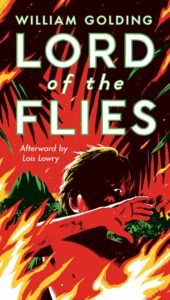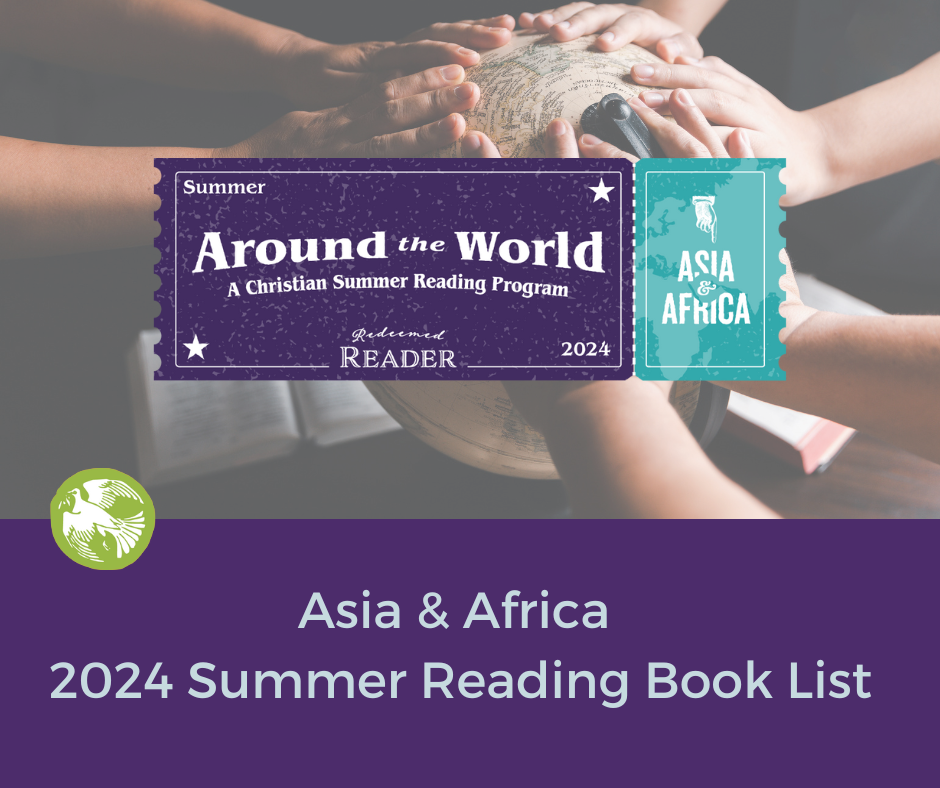When British boys are stranded alone on an island, can they govern themselves?
Reading Level: Teens, ages 12 and up
Recommended For: Teens, ages 15 and up
Summary of The Lord of the Flies

A plane crashes on a deserted island in the middle of nowhere. Pilot? Killed in the crash? Passengers? A group of boys, ranging in age from fairly young (age 6 or so?) to young teens. Adults? None. The boys (all British) were being evacuated during war-time, although why they’re in the middle of the Pacific is never really explained. Presumably, as good British boys in the mid-20th-century, they must have grown up reading the likes of Robinson Crusoe along with plenty of other island stories. As all good British boys would know to do, they meet as a group and discuss some priorities, namely: how do we stay civilized on this island? What do we need to pursue order?
From the beginning, it’s clear that some boys have a better grasp of civilization, order, good governance (both self-governance and that of others), and essential priorities required to sustain life (i.e. food and shelter along with a plan to signal for rescue). It’s also clear straightaway that some boys do NOT have this same grasp. Alliances are made, lines are drawn in the not-just-proverbial sand, and tension steadily grows. Two thirds through the book, the reader instinctively knows that this is not going to end well (if he or she hasn’t already come to that conclusion).
The Lord of the Flies: Brilliant
The Lord of the Flies is a brilliant book (except for the very last few pages). And, it’s safe to say it is the literary forerunner of many popular teen books and series today, not least of which include The Hunger Games series and The Maze Runner series. What makes this book so good? Golding is a master of understatement and suspense. I’ve taught many 10th graders who read this as their summer reading; rarely does a student come to school in August without an Opinion on this book. And yet, the reading demands thought: what exactly happens to the boy with the scar/birthmark on his face? Why is Jack acting that way? What would I do in a similar situation?
As Christians, we can mine this book for gold. Rarely do books these days show us human nature in all its depravity without wallowing in that depravity, excusing it, or pandering to the audience. Golding isn’t graphic; he doesn’t give us such gruesome details that we get caught up in blood and guts, missing the main point. He’s not funny or silly, either. In sparse text, he manages to communicate far more than modern series that spawn 5 or 6 hefty tomes: the enemy is within. The enemy is our sin nature and Satan himself. On our own, we cannot save ourselves. We are just like Ralph, stuck on that island, fighting a desperate fight for the good, true, and beautiful, but without hope save in an outside Rescuer.
The Lord of the Flies: How I Teach It
Since this is often a summer reading choice for my students (including my own three children this coming year!), it’s what we start the year off discussing. The Lord of the Flies provides a terrific primer on key literary elements like foreshadowing, symbolism, theme, etc. While obvious, these elements don’t take away from the reading experience. After reviewing key elements as a refresher course, we discuss worldview and the general narrative thread of Scripture (creation-fall-redemption). The Lord of the Flies, once again, is easy: when the boys arrive on the island, that’s creation. Most of the book reveals the fall and its effects, showing that mankind needs deliverance. The rescue at the end reminds us of redemption. Thankfully, our redemption is not like the boys’: our Rescuer fully understands what we’ve gone through and has suffered on our behalf. To my thinking, this is the weak link in Golding’s book: his rescuer is flippant and cavalier. We’re left wondering if Ralph really will be okay, will he get over this experience?
Essay options abound: Compare/contrast this book with another, modern dystopian book (The Maze Runner and The Hunger Games are both perfect choices here). Who, or what, is the beast (metaphorically, as well as literally)? Why a pig’s head for the “Lord of the Flies”? Why does Golding use that as the title of the book? Discuss the glasses: their symbolism, role in the plot, why Piggy has them and no one else, etc. These are all great essay choices to encourage students to analyze or discuss in light of a biblical worldview.
In short, The Lord of the Flies is a solid choice for high school students to read and discuss, particularly in light of a biblical worldview. However, I’d save this book for 10th grade and up. Much younger and students get so caught up in the plot that they miss the forest for the trees; students need enough maturity to read with some objective distance.
Considerations:
- Violence: there’s a reason some people won’t read this book (or are afraid to). In light of today’s movies and books, the violence in this book isn’t extreme (in terms of being graphic). But there are some troubling scenes, and some boys do die.
- Images: Thankfully, there are no pictures! Some scenes are quite gruesome, though.
- Racism: The boys frequently refer to “savages” disparagingly. Only once do they mention “Indians,” but, since they are comparing British ways of life to “savages,” it’s partly true that anyone not British is a savage in their minds (i.e. the French might be deemed “savages”). Worth talking through that distinction with your students.
- Discuss: Consider talking through this “real life” Lord of the Flies experience: was Golding wrong in his predictions of what human nature would do if left unattended? Do we need outside authority? Can we govern ourselves?
Overall Rating: 4
- Literary/Artistic Rating: 4.5
- Worldview Rating: 3.5
Recommended Reading from Redeemed Reader:
- A Review: Talking Over The Hunger Games, part 1
- A Resource: Is The Kite Runner Appropriate? (another post about assigned school reading!)
- A Resource: 13 Books for 13 Year Old Boys (and older!)
We are participants in the Amazon LLC affiliate program; purchases you make through affiliate links like the one below may earn us a commission. Read more here.
Stay Up to Date!
Get the information you need to make wise choices about books for your children and teens.
Our weekly newsletter includes our latest reviews, related links from around the web, a featured book list, book trivia, and more. We never sell your information. You may unsubscribe at any time.
Support our writers and help keep Redeemed Reader ad-free by joining the Redeemed Reader Fellowship.
Stay Up to Date!
Get the information you need to make wise choices about books for your children and teens.
Our weekly newsletter includes our latest reviews, related links from around the web, a featured book list, book trivia, and more. We never sell your information. You may unsubscribe at any time.
We'd love to hear from you!
Our comments are now limited to our members (both Silver and Golden Key). Members, you just need to log in with your normal log-in credentials!
Not a member yet? You can join the Silver Key ($2.99/month) for a free 2-week trial. Cancel at any time. Find out more about membership here.
7 Comments
Leave a Comment
You must be logged in to post a comment.




I don’t really think the rescue at the end is supposed to remind readers of Christ’s redemption. I’ve only read the book once for school but the impression I got was that it was supposed to imply that even civilized adults are monstrous too. Every commentator I’ve read has said the same.
While the book’s portrayal of the human heart as desperately wicked definitely resonates with Christianity, the book wasn’t really trying to be a Christian allegory, so I’m not sure if it makes sense to say that its lack of a Christ figure or redemption is a weak link.
Oh, I would certainly agree: Lord of the Flies is most definitely NOT a Christian allegory. I have no idea whether Golding was a Christian or even cared about Christianity. But, as a Christian, I am always on the lookout for the ways in which the stories I read reflect the ultimate Story of Christ rescuing His people, the story arc of Scripture. That’s the lens through which read. In that sense, Lord of the Flies is a great book to mull over. We all want to identify with Ralph, but really, we’re all like Jack: rebelling against authority and not even trying to be rescued. Thankfully, God DOES rescue us. When I suggest comparing the man at the end with Christ, it’s actually because he’s so different from Christ. Unlike the man in Golding’s story, our spiritual rescuer doesn’t show up, puzzled at what’s going on. Rather, He experienced all of it FOR us, He suffered the ultimate price, and He chose to rescue us anyway even when we were running away. Usually, assuming I’m teaching in a Christian setting, I can ask students to compare the two and students will volunteer similar answers on their own. Similarly, when I teach Shakespearean tragedies, and we get to the climax of the story when the protagonist’s tragic flaw is in full force and the end of the story is basically guaranteed (death!), I like to remind my students that there is never a “point of no return” in our stories because Christ can intervene even at the very end (I write more about that here.) Any great story worth its salt is going to reflect the world God made and the way He made us, at least in part, regardless if the author intended that or not. It will never be a full representation, but God’s ultimate Story is in our DNA, as it were. That’s the way God’s world works! And, to the degree that the story doesn’t reflect that ultimate story, I think it’s fair to say that’s where the story is weak. Golding’s ending with the weak/monstrous rescuer is part of what makes his story (and, therefore, his view of humanity) such a depressing one. Unlike Golding, I think we DO have hope. Megan writes about that view of Story and Truth here. I don’t have these sorts of conversations about every book I read with and to my kids/students, but even a few of them along these lines help them start to make those connections.
Excellent review! You hit the nail on the head as to the age level – and the fact that it MUST be discussed through a Biblical worldview. One of the most troubling books I ever read in my young life.
My daughter was assigned this in high school in ’82. I had never heard of the book. I read through it and decided right then, this was not something she was going to read. I informed her teacher of that fact, which she did not agree with. I said to her, “I have a young Christian girl and she will not read such depravity as this. There is nothing Christ like about it and does not teach any moral values.” I think the book is awful and only encourages negativity, depression and evil thoughts to young minds, because their imagination is so vivid sometimes. I would take this book off the shelves for middle schooners and high schoolers alike. Needless to say, she read a different book. ✝️
I’m glad your daughter’s teacher let you swap in a different book. That’s something many parents are facing these days for a whole range of books, and, as parents, we often have to advocate for our kids. I’d also agree with you that it’s not a book for middle schoolers. But for high school students, it can be a profitable read when it’s discussed through the lens of Scripture. Janie calls this book “a literary exploration into the doctrine of total depravity” and I think that’s a good sum-up. As such, it absolutely should disturb us when we read it, and show us our own need of God’s grace.
I remember reading this book, I believe in HS. I would love to know your thoughts on my 8th grader reading it. I was very surprised when she told me tonight they were going to read it. I am very concerned about a lot of the content and I’m not sure she is mature enough for it. I wouldn’t mind her reading it maybe later in HS and I also think I would like to be able to have the dicussions with her from a Biblical worldview and be able to help her to see it in a broader view like you said with “some objective distance”. I’m afraid it will be very disturbing to her and that she will miss the important takeaways.That being said, we read Animal Farm together last spring and she was able to understand the ideas. I guess I would love your opinion on whether I should excuse her from the unit. Or maybe some other thoughts I could give her teacher about this. Perhaps you have some questions I could ask to her to help me decide if it will be beneficial for my daughter to read this year. I don’t want to automatically dismiss it, but I don’t remember it well enough and I do know it was disturbing to me even as a relatively mature 9th or 10th grader.
Thanks for your thoughts! (if you see this or have the time that is)
Animal Farm is a fantastic book for middle schoolers! As to whether your daughter should read Lord of the Flies or not, it’s not a very long book. If you have time, my first suggestion is to read the book yourself and decide based on that. Lacking that time, a lot depends on the school setting in which she’ll be reading the book and how that school might approach the book. There’s one semi-graphic scene with poor Piggy and his demise. Otherwise, the vast majority of the writing leans heavily on “mood”–Golding manages to describe violence and allude to the darkness with remarkably spare language, given what’s going on. The book is supposed to be disturbing, and, well, it succeeds. But it succeeds without overly vivid imagery compared to many books today. Is your daughter easily frightened or disturbed by what she reads (or watches in movie form)? If not, then she’s probably fine. Your awareness of the book’s complexities and darkness will help you talk it through with her. If she IS easily disturbed or frightened, or seems to lack the maturity to handle the deeper themes in books, then you might request she be excused. A book I might substitute is The Giver. It’s not as complex nor as dark. But it does bring up issues of self- and community-governance, both of which feature prominently in Lord of the Flies. And it also has some shocking moments when the reader comes to an abrupt awareness of sinister goings on.